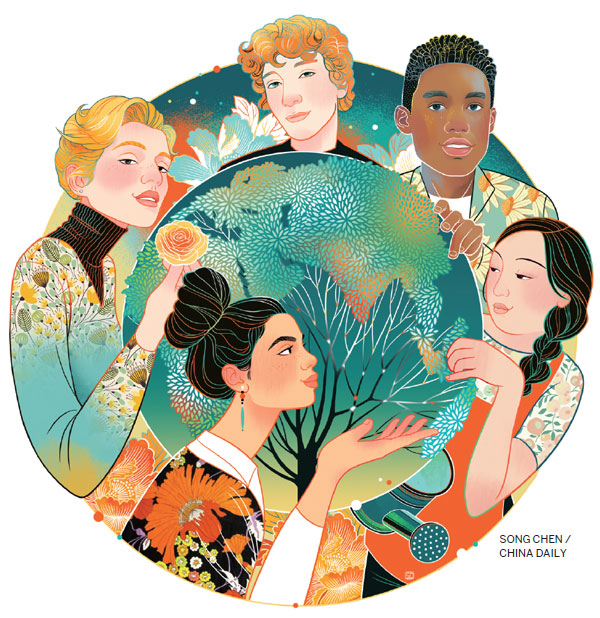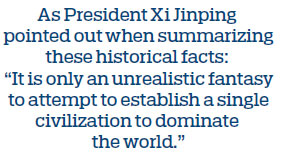Variety is the spice of life
No civilization is superior to another, each has its own beauty and uniqueness and has something that others can learn from
The coexistence of human civilizations since ancient times was shattered by the colonial expansion of the West. The diversity of civilizations seemed to have come to an end with the "superior civilization" mentality of the Western countries, which viewed Western civilization as more "advanced" than others, and thus one that should be embraced by all countries - through use of force if necessary. In the process many civilizations have been lost or are facing crisis of survival.
However, since this view has been proved wrong in history and reality, Western hegemony has reached its peak. There is now a global movement for the modernization and revival of civilizations. A growing understanding that all civilizations are equal in value, each has its own merits and shortcomings. None is perfect or superior. This is the situation at the beginning of the 21st century and it represents a new historical turning point.

Modernization of human civilization began in Western Europe with the revolutions in science and technology and the revolution in France. And the course of modernization that has now begun is the revival of the diversity of civilizations, in which non-Western countries can learn from the West and catch up, while presenting their own strengths for Western countries to learn from. The history of human civilizations tells us that every civilization needs to evolve by advancing with the times.
There are different approaches to modernization, even within a civilization as shown by Western countries. For the United Kingdom, it came through gradual reforms; for France, revolutionary violence; for Germany, top-down changes; and for the United States, the struggle for independence.
And even within the same country, there can be different cultures, thus making diversity a normal characteristic of civilization. Such a reality is evident even in Western countries, but the diversity in the non-Western regions is more apparent with the surging tide of modernization. Now, as can be readily seen, every country has its own characteristics in the process of modernization, regardless of where it is along the path.
We see that influential leaders play important roles in their own countries' modernization: Mahatma Gandhi's nonviolent and non-cooperative movement, Fidel Castro's Cuban revolution, Gamal Abdel Nasser's Arab socialism, and Nelson Mandela's struggle against the apartheid system in South Africa. Their roles have all contributed to their countries' characteristics of modernization. However, none of these successes are replicable. A stereotypical framing of civilization is not only impossible, but also very harmful.
As President Xi Jinping pointed out when summarizing these historical facts: "It is only an unrealistic fantasy to attempt to establish a single civilization to dominate the world."
But the Western theory in the name of "globalism" favors unity over diversity. Francis Fukuyama's famous bon mot about the end of history was in fact a supposition that had long existed, for it was already in the logic of Hegel. The difference being that for Hegel, Prussian civilization was the end, for Fukuyama, it was the civilization of the United States.
Does the diversity of civilizations mean that there must be conflicts, and that these conflicts must be a matter of life and death? Why can't it be, as the ancient Chinese philosophers said: "One begets two, two begets three, and three begets all things?" Or as the Chinese proverbs goes: "Harmony generates wealth" and "harmony is supreme"?
The Chinese view of human civilization is "we should act like the sea taking in all rivers".

As Xi said in his keynote speech at the opening ceremony of the conference on Dialogue of Asian Civilizations: "All civilizations are rooted in their unique cultural environment. Each embodies the wisdom and vision of a country or nation, and each is valuable for being uniquely its own."
Civilizations vary from each other, just as humans are different in terms of skin color and the language used. No civilization is superior to others. To believe that one's own race and civilization is above others is foolish. If everyone looked and thought the same the world would indeed be a dull place to live in. Likewise, it would be less interesting with one homogenous civilization.
The modern world can accommodate different civilizations which, in turn, creates a more diverse and vibrant world. It is through more than 100 years of modernization that many ancient civilizations have revived. They have restored their self-confidence and found their own identities. The unequal relationship between civilizations that were once distorted by Western hegemony is now being redressed. It is not as the US political scientist Samuel P. Huntington sees it as the "clash of civilizations", but it is rather "the return of civilization". "Return" means that the diversity of civilizations is restored, and so is their equal relations. It also means that people are thinking more about the modern meaning of ancient civilizations and using traditional wisdom to solve modern problems, such as the problems in the relations between humans and nature, morality and interests, individuals and groups, freedom and discipline. In this ever-changing world, only by relying on the joint efforts of all civilizations can we solve the common problems of mankind.
The 21st century is new, and we are opening an era in which all civilizations will coexist and humans will prosper as a whole. After all, we all live on the same planet, and only common prosperity can ensure a shared future for mankind. Facing new opportunities and challenges, we should see that a human community with a shared future is not only our common responsibility but also our ideal.
The author is dean of the Institute of Area Studies and a professor of Department of History at Peking University. The author contributed this article to China Watch, a think tank powered by China Daily. The views do not necessarily reflect those of China Daily.
(China Daily Global 06/11/2019 page13)


















